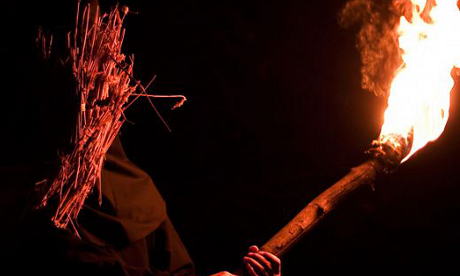Director: Ben Wheatley
Writer: Amy Jump, Ben Wheatley
Year: 2011
Cast: Neil Maskell, Michael Smiley, MyAnna Buring
★★★★☆
Billed as the best British genre film in years, Kill List comes with a reputation considerably greater than its budget. The second feature from writer-director Ben Wheatley, it is a dark, surreal hit man film that you are not likely to forget in a hurry.

It opens as an unnerving family drama, with extended scenes that depict a former serviceman, Jay (Neil Maskell), recovering from the psychological trauma of combat and the glum reality of unemployment. His relationship with his wife, Shel (MyAnna Buring), is turbulent to say the least, and, even their young son, Sam (Harry Simpson), appears afflicted by the claustrophobic domestic situation. Brought up on war stories and his parents shouting through the walls, his playtime revolves around conflict and, in an early scene, he is shown cutting his father while he is shaving at the sink. Wheatley creates an atmosphere in which nobody can be trusted – Jay can only listen helplessly while Shel pours out her emotions in a foreign language down the phone – is she having an affair? is she a spy? It is impossible to know. The disconnect, the extent of their mistrust, becomes significant as the plot progresses.
The tension, wrought from the outset, is finally released at a dramatic dinner party, which sees the introduction of Jay’s partner, Gal (Michael Smiley), along with his new girlfriend, Fiona (Emma Fryer), who has more to her than meets the eye. Jay and Shel fight viciously, with plenty of collateral damage to the crockery, before reconciling unconvincingly. Afterwards, Gal encourages Jay to forget what has happened in the past, alluding to a disastrous mission they undertook together in Kiev, and accept a job that they have been offered. It is simple; three people make up the kill list.
Once the action begins, it is brutal. We are told that these are bad people, they have to suffer. We have to watch. Wheatley pulls no punches and never cuts away, even when Jay takes a hammer to his victim’s skull; it is ruthless and visceral, but, at the same time engrossing. As well as the crude violence, there is something lingering beneath the surface, that unsettling feeling persists throughout the film, insinuating the presence of an unknown horror.

Close-ups are used heavily to create an obsessive, voyeuristic atmosphere and the way the British landscape is captured on camera, stripped of colour, devoid of characteristics, entirely banal, creates an impression of indefinable gloom. The film has a nightmarish quality and uses distinctive, unexplained images to heighten the effect, such as Fiona standing outside in her nightdress, waving slowly, pointedly at the window of a motorway hotel. The score adds to the disorientation; it is overt, in your face, made up of harsh sounds and curious whistles.
It is this blending of the innocuous and the brutal that makes Kill List so engrossing. The tap-tap-tapping of the teaspoon against the cup, the domestic violence, the hammer blow to the head. It all seems connected somehow, like an expression of some inherent pent-up anger or collective death wish. Wheatley hints at a social commentary as well; the targets for assassination are a priest, a librarian and an MP; there are vague murmurings about the war. The message is not coherent, but you get the impression that there is something rotten at the core of the world that is portrayed.
The denouement only serves to confuse the message. It is arbitrary and slightly derivative, seemingly added for effect alone. Fortunately, as with the rest of the film, you can’t argue with the effect. The climax is a powerful piece of cinema, shocking and unsettling, played out by firelight in the dark. Exactly what it means will be debated – it probably won’t be fully understood – but, ultimately, it doesn’t matter. Despite the confounding finale, Kill List is a wonderful British horror film, stark and brutal, superbly shot, with imagery to haunt you for years.